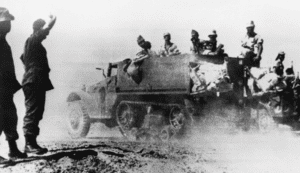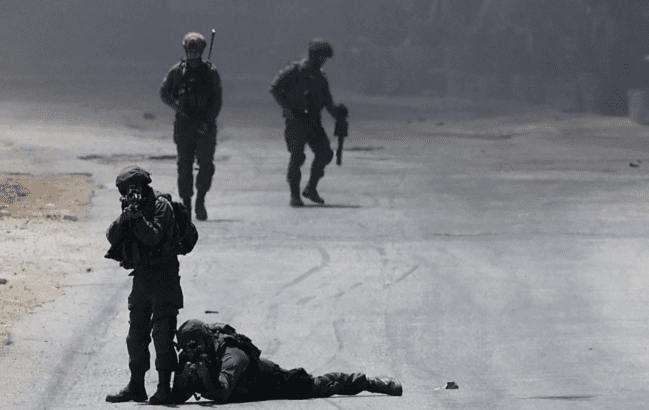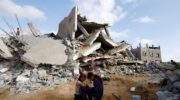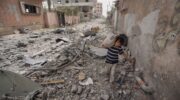Israel’s state of permanent war: Israeli soldiers take position as they target Palestinian youths who protest against the occupation on 11 June 2021
The irony that Israel, which is a nuclear menace and major aggressor in the Middle East region, portrays itself as a victim of its neighbours cannot be overstated. To legitimise the state of permanent war, Israel sought early on to portray its citizens as actual or potential victims of wars and persecution inflicted by Palestinian resistance and Arab states, which in turn necessitated Israel’s use of permanent war and persecution as “retaliation”.
by Joseph Massad, reposted from Middle East Eye, December 30, 2021
Over the last few decades, Israel has been threatening war against Iran incessantly. Theatrical performances have been staged at the United Nations, such as in 2012, when former Israeli Prime Minister Benjamin Netanyahu presented a cartoonish diagram of a bomb symbolising Iran’s alleged nuclear threat; or when, in 2018, he brandished an amateurishly labelled Google map of an alleged Iranian nuclear site.
Such Israeli propaganda has been accompanied by much huffing and puffing by the country’s military and civilian leaderships, which have been interchangeable at least since General Yigal Allon became acting prime minister in 1969 (although earlier Israeli prime ministers, including David Ben-Gurion and Levi Eshkol, also played major military roles).
Israel the real nuclear threat
Yet it is Israel, not Iran, that has been in possession of nuclear bombs since the 1960s – and it is Israel that allegedly had plans to use them during the June 1967 war, and again when it was losing in the early days of the October 1973 war.
Israel had acquired the ability to make nuclear weapons from none other than France, which conspired with Israel in the latter’s 1956 invasion of Gaza and the Egyptian Sinai, in return for which the Israelis demanded that France build them a nuclear reactor at Dimona.
In 1973, Israel reportedly loaded 13 nuclear bombs and was ready for them to be dropped on Egypt and Syria, had the US not come through with an air bridge of weapons that turned the war in Israel’s favour.
The irony of Israel, which is a nuclear menace and major aggressor in the Middle East region, portraying itself as a victim of its neighbours cannot be overstated. One of the most remarkable features of the establishment of this settler-colony in 1948 was its insistence on establishing a state of permanent war in order to expand its territory for further zionist colonisation and to safeguard its colonists from anti-colonial resistance.
Ongoing persecution
Many western countries that supported the 1947 UN Partition Plan, which gave Israel its birth certificate, claimed that in supporting Israel’s creation, they aimed to avert war and the persecution of Jewish colonists if Palestine’s Arab majority achieved independence in one state.
But in supporting the creation of a settler-colonial state, they inflicted on the Middle East as a whole a state of permanent war and ongoing persecution of Palestinians and other Arabs whose territories Israel conquered.
To legitimise the state of permanent war, Israel sought early on to portray its citizens as actual or potential victims of wars and persecution inflicted by Palestinian resistance and Arab states, which in turn necessitated Israel’s use of permanent war and persecution as “retaliation”.
US knew in 1948 that Arab armies were no threat
This was clear to Israel’s western supporters as early as 1948. The Israeli expulsion of the Palestinian population, along with Israel’s territorial encroachment upon their UN-designated territories, became the casus belli for weak and ill-equipped neighbouring Arab armies to intervene in May of that year to put a stop to the ongoing ethnic cleansing and colonisation. The weakness of the Arab armies, however, was well-known to the Americans and the Zionists.
Former US Secretary of State George Marshall’s assessment was as follows:
whole govt structure [of] Iraq is endangered by political and economic disorders and Iraq Govt can not at this moment afford to send more than [the] handful of troops it has already dispatched.
Egypt has suffered recently from strikes and disorders. Its army has insufficient equipment because of its refusal of Brit[ish] aid, and what it has is needed for police duty at home.
Syria has neither arms nor army worthy of name and has not been able to organize one since [the] French left three years ago. Lebanon has no real army while Saudi Arabia has [a] small army which is barely sufficient to keep tribes in order.
Jealousies between Saudi Arabs and Syrians on one hand and Hashemite govts of Transjordan and Iraq, prevent Arabs from making even best use of existing forces.
Pattern of claiming victimhood
A member of the US delegation to the UN observed on 4 May 1948 – just days before Arab armies intervened – that the Security Council would soon be confronted with the question as to “whether Jewish armed attack on Arab communities in Palestine is legitimate or whether it constitutes such a threat to international peace and security as to call for coercive measures by the Security Council”.
The draft memorandum noted that if Arab armies entered Palestine this would lead Jewish forces to claim “that their state is the object of armed aggression and… use every means to obscure the fact that it is their own armed aggression against the Arabs inside Palestine which is the cause of [the] Arab counter-attack”.
When Israel conspired with France to invade Egypt in October 1956, it was part of the cycle of permanent war it sought. The Israelis occupied Gaza and the Sinai and refused to withdraw for four months, despite UN and US condemnation. Israel finally had no choice but to withdraw and try again a decade later.

In 1967, Israel would claim that it had to invade three Arab countries preemptively before they attacked it, deploying the very same arguments as in 1948. It occupied more lands and persecuted more Palestinians, Syrians, and Egyptians.
This would be followed by its unceasing war against Lebanon, which began in the form of periodic raids in the late 1960s to outright invasions in 1978 and 1982, and more occupation and persecution of the Lebanese and Palestinian peoples.
In 1973, Israel shot down a Libyan civilian airliner over the Sinai, killing all 106 people on board. Israel’s 1981 attack on a nuclear reactor in Iraq, which was still under construction by France, was also justified with Israel’s claim that “we were therefore forced to defend ourselves”.
Over the decades, in addition to killing tens of thousands of Arab civilians and creating millions of Palestinian refugees, Israel displaced a million Egyptians during the War of Attrition in the late 1960s, and hundreds of thousands of Lebanese people through its invasions of Lebanon since 1978.
Oppress, crush resistance, repeat
Under the pretext of defence, in the last few years, Israel has periodically bombed Syria, Lebanon, and Gaza. Meanwhile, its killing machine and military persecution, along with its colonial settlers, continue to target Palestinians in the occupied West Bank and East Jerusalem, as well as Syrians in the Golan Heights.
Israel’s racist police and legal apparatus unceasingly target Palestinian citizens of Israel. Yet, Israeli propagandists insist that Israel is merely “defending” itself against the aggression of those it oppresses, colonises, and invades.
Israel’s ongoing attack on the Palestinian neighbourhood of Sheikh Jarrah, triggered by its theft of Palestinian homes; its continued racist persecution of Palestinian citizens of Israel; and its jailing of two million Palestinians in Gaza triggered massive Palestinian resistance this past May.
[In 2021], the Palestinians’ ability to bring the state of permanent war home to Israel was unprecedented, transforming the Israeli-Palestinian confrontation and the regional military equation in major ways.Permanent war
Since its founding, Israel has invaded Palestine, Jordan, Lebanon, Egypt, and Syria; bombed Iraq, Sudan, and Tunisia; taken an aggressive posture towards Iran, Libya, Yemen, Morocco, and Algeria; and is the only country in the region that possesses and threatens to use nuclear weapons. Yet, Israel continues to claim unabashedly that it is the victim.
It is clear that Israel’s pretexts and justifications for its continued aggression and imposition of a state of permanent war on the region still rely on the very same arguments, and aim to achieve the very same goals, that it set for itself at the moment of its birth.
Joseph Massad is professor of modern Arab politics and intellectual history at Columbia University, New York. He is the author of many books and academic and journalistic articles. His books include Colonial Effects: The Making of National Identity in Jordan; Desiring Arabs; The Persistence of the Palestinian Question: Essays on Zionism and the Palestinians, and most recently Islam in Liberalism. His books and articles have been translated into a dozen languages.
READ MORE ABOUT ISRAEL’S HISTORY OF STIRRING UP CONFLICT:
- Pentagon officer described how Israelists manufactured anti-Iraq disinfo that led to war
- Oil for Israel: The Truth about the Iraq War, 15 Years Later
- Fighting Israel’s Wars: How the U.S. military and government have become Zionized
- Philip Giraldi says pro-Israel groups & “deep pocket” individuals drive America’s Middle East wars
- Who Started the Six Day War of June 1967?
- The Six Day War and Israeli Lies: What I Saw at the CIA
- Gideon Levy: Israel Loves Wars
- Secret gag order hides Israel’s espionage & theft of US nuclear technology
- Israel’s War Crimes Have Killed Americans
- Ten years after the first war on Gaza, Israel still plans endless brute force
- The Forward reports that U.S. presidents signed secret agreements with Israel to cover up Israeli nuclear weapons
VIDEOS:




